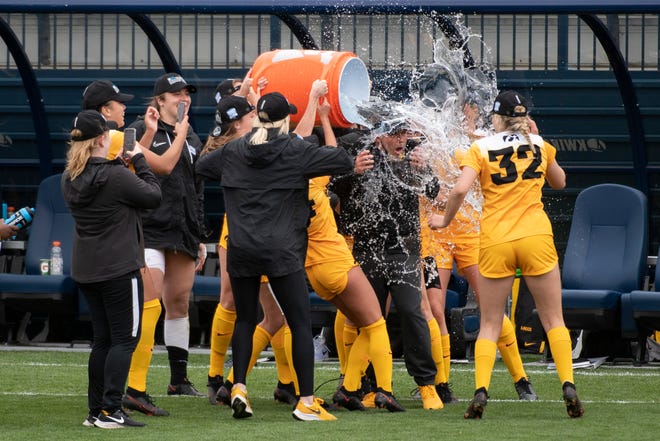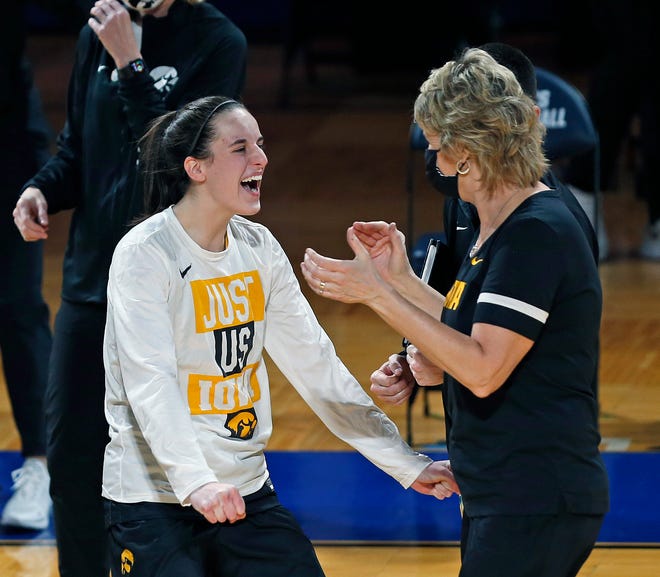Leistikow: Field hockey's Final Four the latest success in a remarkable year for Iowa Hawkeyes athletics
 Chad Leistikow
Chad LeistikowLisa Cellucci’s Iowa field hockey team has taken the baton for Hawkeye sports this week, with a Friday matchup in the program’s first Final Four in 13 years.
Before that, it was the Iowa women's soccer team that captured the attention of Hawkeye fans everywhere with a magical and unlikely postseason run.
It seems like there’s been one history-making thing after another for University of Iowa athletics in this unconventional 2020-21 calendar … because there has been. As they cheer for each other, Hawkeye teams almost seem to be one-upping each other. In a good way.
“We’re becoming a real, holistically successful athletics department,” Iowa women’s tennis coach Sasha Schmid said. “… You can hardly keep up on Twitter with all of the teams you (can) congratulate.”
Before we get to the “why,” let’s start with the “what.”
Football was the first Iowa sports team to play amid a new era of daily COVID-19 testing, and Kirk Ferentz’s team responded with a strong 6-2 season that ended with a No. 15 final national ranking. Here are some of the remarkable things that followed:
- Men’s basketball under Fran McCaffery recorded its highest NCAA Tournament seed (No. 2) since 1987 and had the national player of the year in Luka Garza.
- Women’s basketball under Lisa Bluder roared into the Big Ten championship game as a No. 6 seed behind sensational freshman Caitlin Clark, then rode that momentum into the NCAA Tournament’s Sweet 16.
- Wrestling under Tom Brands and led by Spencer Lee got its long-awaited coronation, completing a second straight perfect season (this one not stopped by COVID-19) with the program’s first NCAA championship since 2010.
- Women’s gymnastics under Larissa Libby collected the program’s first Big Ten regular season title behind conference freshman of the year Adeline Kenlin.
- Men’s track and field under Joey Woody raced to the program’s first outright indoor Big Ten championship since 1929 in a dominating late-February performance; the women tied for their best finish (third) in program history.
- Women’s tennis under Schmid came within an eyelash of its first NCAA Tournament since 2010 and featured the program's first-ever Big Ten player of the year in freshman Alexa Noel.
- Men’s tennis, in its final season under Ross Wilson, qualified a doubles tandem (Will Davies and Oliver Okonkwo) for the NCAA championships for the first time since 1989.
- Men’s golf under newly named Big Ten coach of the year Tyler Stith was within one stroke of a conference championship, and Iowa’s Mac McClear was the Big Ten medalist.
- Women’s soccer under Dave DiIanni, after a 2-8-1 regular season, won four straight games as a No. 12 seed to earn the program’s first Big Ten tournament championship, then nine days later picked up the first NCAA tournament win in program history by beating Campbell, 1-0.
- Field hockey under Cellucci has carried a top-four national ranking all season and now charges into Friday’s national semifinal at two-time defending NCAA champion North Carolina (Noon CT). The Hawkeyes are legit national-title hopefuls.
And the athletic year’s not done. Renee Gillispie’s softball team is trending up, in position to deliver the program’s first winning Big Ten record since 2012. Woody’s men are well-positioned to give Iowa athletics a fifth Big Ten title this calendar year in the outdoor track championships next weekend in Champaign, Illinois. Rick Heller’s baseball team is knocking on the door of its first NCAA regional bid since 2017.
This is new turf for Iowa athletics. Outside of wrestling, there were only two Big Ten championships from Hawkeye teams in 24 sports between 2009 and 2018 — men’s outdoor track in 2011 and baseball in 2017. That’s it.
To try to understand how this year has come together, it helps to narrow the focus to three women’s coaches who share a training facility — Cellucci (field hockey), Schmid (tennis) and DiIanni (soccer). Their perspectives can help paint what’s happened in the bigger picture.

Navigating the COVID-19 pandemic became an unexpected step in a successful sports year.
Text messages can arrive as early as 5 a.m., and that’s perfectly normal for these driven coaches. Cellucci and Schmid are dear friends who were athletes together at Iowa in the late 1990s. DiIanni and Cellucci might trade ideas in sports that have similar goal-scoring and goal-defending tactics.
The bond between the three of them got even tighter in mid-August, when they collectively felt the gut punch of the Big Ten canceling their seasons, with the hope of trying to play again in the spring.
“We didn’t know for months whether we were even going to have a spring season,” DiIanni said.
What happened in those months? Pauses, quarantines, isolation. Even when team activities were allowed, they wore masks and had to stay six feet apart. But there was comfort among coaches and athletes from various sports that they at least could relate to what one another was going through. Especially among coaches in various sports, already tight bonds grew tighter.
As they waited for word on whether sports would resume in the spring, Schmid recalled, "We really relied on each other. In return, you just feel a connection to every program.”
Schmid described a widespread relationship among Iowa coaches that lifted each other up during the pandemic. She flashed back to a pre-COVID time when Heller, the baseball coach, recruited her help to learn about the “split step” in tennis. He told her, “I want you to teach the split step to me so I can help my shortstop.”
Schmid described other times when Bluder, the longtime women’s basketball coach, would e-mail her a note of encouragement before a big tournament. When her team narrowly missed the NCAA postseason Monday night, Heller was one of the first to text her his condolences.
“Those can be difference-makers,” Schmid said.
Those are the type of organic moments born in kindness and love that can strengthen relationships. So once COVID-19 numbers improved and the green light came, everyone was in a pretty good emotional place — even if the schedules were Big Ten-only and there were questions like, "How do you practice field hockey and soccer in Iowa in February?"
(Certainly not outdoors.)
With 468 days between games, Cellucci’s team had a grand total of one outdoor practice before its Feb. 27 opener. Her team used limited prep time to focus on strength and conditioning.

“We’re like, ‘OK, here we go, guys. Let’s try to make this happen!’” Cellucci said, laughing.
With no preseason schedule and having lost 14 seniors off his previous team, DiIanni’s young group struggled to find early chemistry, but found momentum late.
“I really believe at the end of the day our team won those games because of adversity that they faced in this pandemic,” DiIanni said. “Learning that they were tougher than they thought they could be.
“We’re playing Penn State on the road? OK, no problem. I’ve been on online classes for a year."
In a year that’s seen isolation take its toll on the world, perhaps the camaraderie and resilience built among teams across all sports carried even more weight. Perhaps Hawkeye athletes and coaches realized through the process that they were a part of something bigger.
“We’re so excited when other people have success," Schmid said. "There’s this generosity of spirit and support that I think does start with the head coaches and trickles down to the athletes.”

If success breeds success ... are even bigger things ahead?
As Cellucci’s team prepares to face No. 1 North Carolina ... which has lost just once in the last two years .... and has won 35 in a row on its home field, where Friday's game will be held … her field hockey players are nonetheless thinking: Why not Iowa?
"Just all the success that so many of the sports have had this year at Iowa, there’s great momentum and synergy,” Cellucci said. “The student-athletes are like, ‘We’re not going to be the one that are going home. We want to keep this train going.'"
Even though Schmid’s tennis team fell short in the conference semifinals, she saw her team believing it could win a Big Ten title because of what DiIanni’s soccer team showed was possible.
“But that goal was in their mind because they’ve seen their friends win,” Schmid said. “There is no substitute for that.”
Maybe, conversely, that’s one reason Iowa was annually shut out of Big Ten titles for the better part of a decade; there wasn't enough success department-wide to ignite a chain reaction of momentum.
But Heller’s team breaking through in the 2017 Big Ten baseball tournament as a No. 5 seed was a significant moment. That lit a spark. Bluder’s women’s basketball team and Woody’s track team fanned the flames in early 2019 with unforgettable conference-championship moments. Cellucci’s field hockey team got back on top of the Big Ten in late 2019. Brands reestablished his wrestling team as a Big Ten and national No. 1 in 2020.

And now, the 2020-21 wildfire of success.
Are even better things ahead?
Maybe.
Field hockey will bring everyone back, with all seniors returning in the fall to take advantage of a “free” year of eligibility offered by playing through the COVID-19 pandemic. Same with wrestling. Women's basketball brings back its starting five plus added a key transfer in Iowa State's Kylie Feuerbach.
Safe to say, soccer has never had an opportunity like this. The Hawkeye fans it gained with its postseason run might just stick around if success continues. Heller’s baseball team gained a massive following with its magical 2015 season. Soccer is a similar mainstream sport among so many families in Iowa.
“Expectations are at an all-time high," DiIanni said. "... We’re excited to continue to grow this program beyond where it’s ever been."
It’s been a year, huh?
Yet as the 2020-21 sports calendar proved, the foundation was in place for Iowa athletics to come out of it stronger. Now as more needles go in arms and more masks come off faces, perhaps we're arriving at a new normal — of all or most Iowa sports being a consistent Big Ten title contenders.
“Great recruiting and great coaches,” Cellucci said, summing up the conversation. “… I do think this momentum was building, even before the COVID shutdown. I think the teams buckled down and continued to push and work through it. I think we’ve got a lot of good years ahead of us, too."
Hawkeyes columnist Chad Leistikow has covered sports for 26 years with The Des Moines Register, USA TODAY and Iowa City Press-Citizen. Follow @ChadLeistikow on Twitter.
Field hockey: Iowa in the Final Four
Friday’s NCAA semifinal: No. 4 Iowa (12-5) vs. No. 1 North Carolina (17-1)
Where: Karen Shelton Stadium, Chapel Hill, N.C.
How to watch: Noon CT Friday, ESPN3 online feed
The winner faces: The winner of Friday's later semifinal between No. 3 Louisville (14-5) and No. 2 Michigan (14-2) at 6 p.m. CT Sunday. Michigan won the Big Ten Tournament in Iowa City.
Key to Hawkeye victory: Iowa ranks in the top three nationally on defense. “People have had a real hard time having offensive success (against us),” coach Lisa Cellucci said. “It’s going to be important to us to try to get on the board fast. We’ve been able to hold a lot of leads this year."